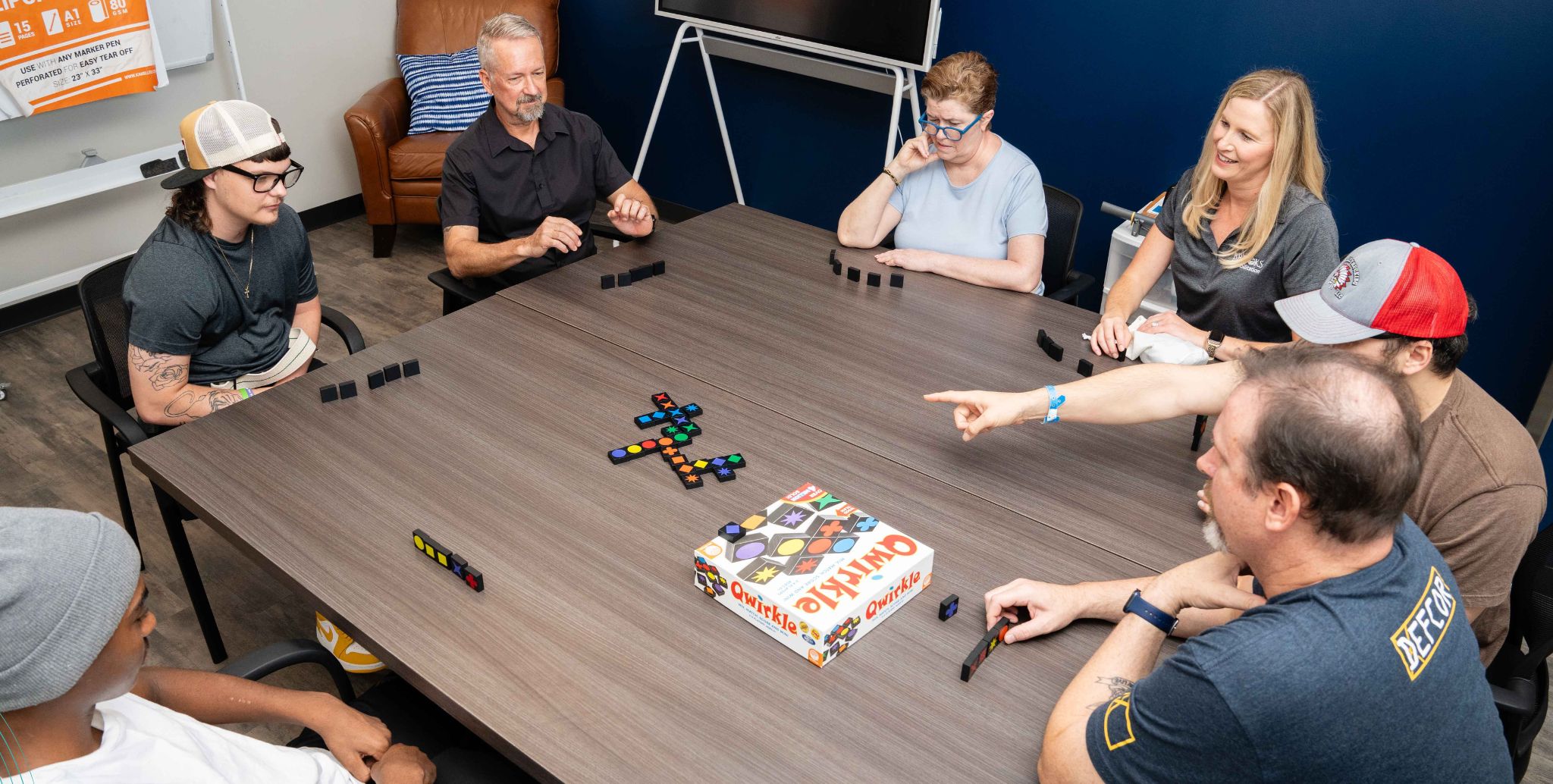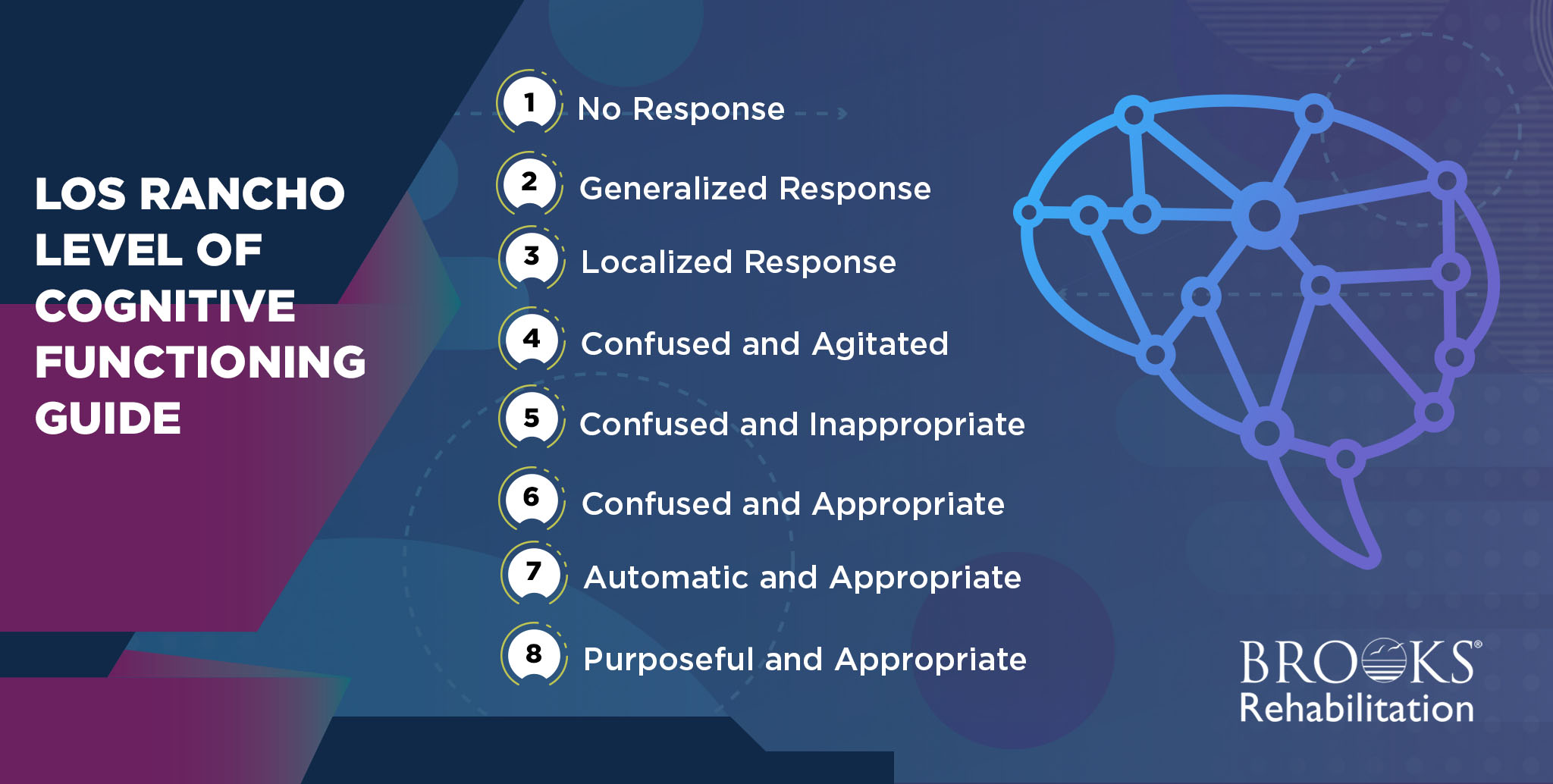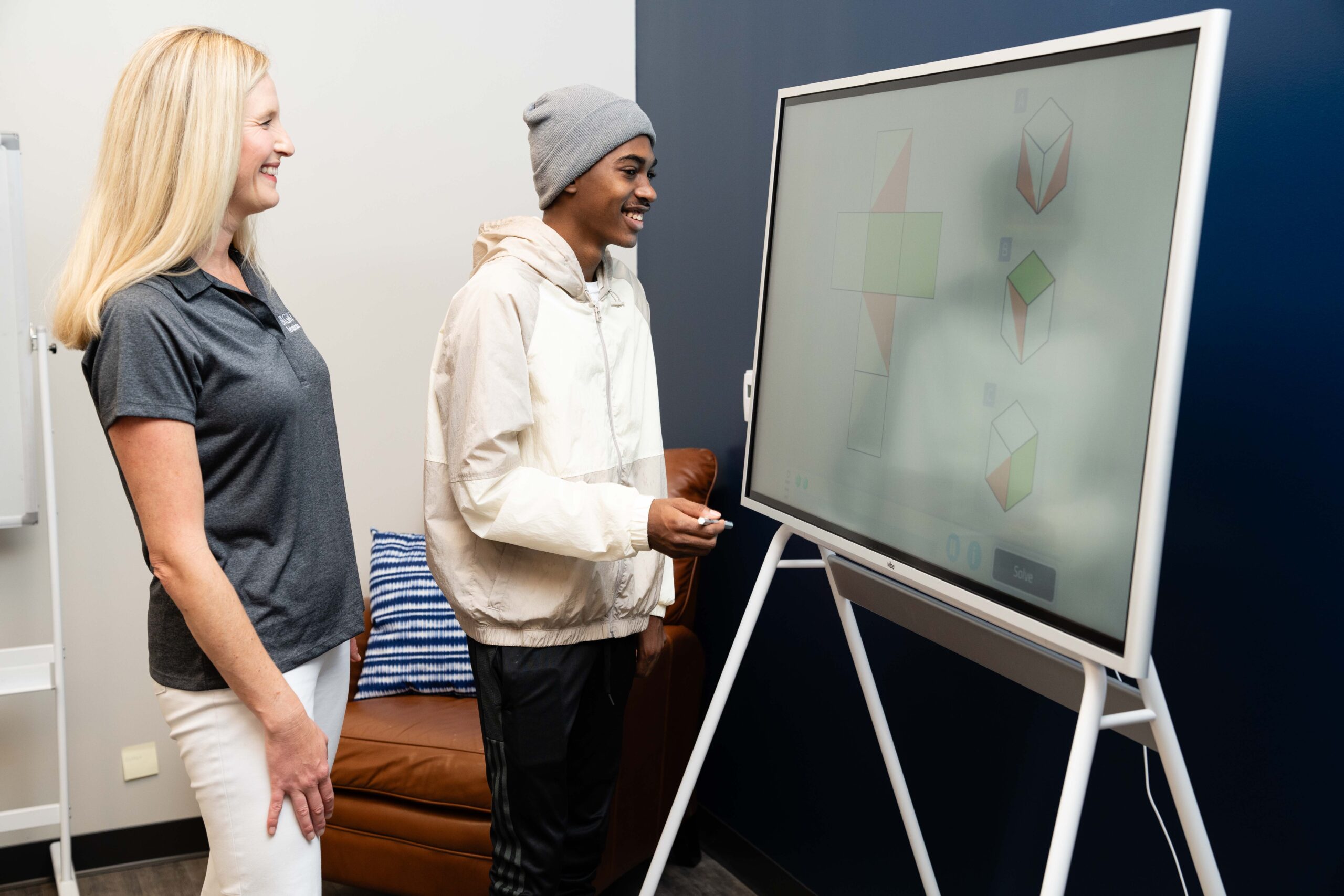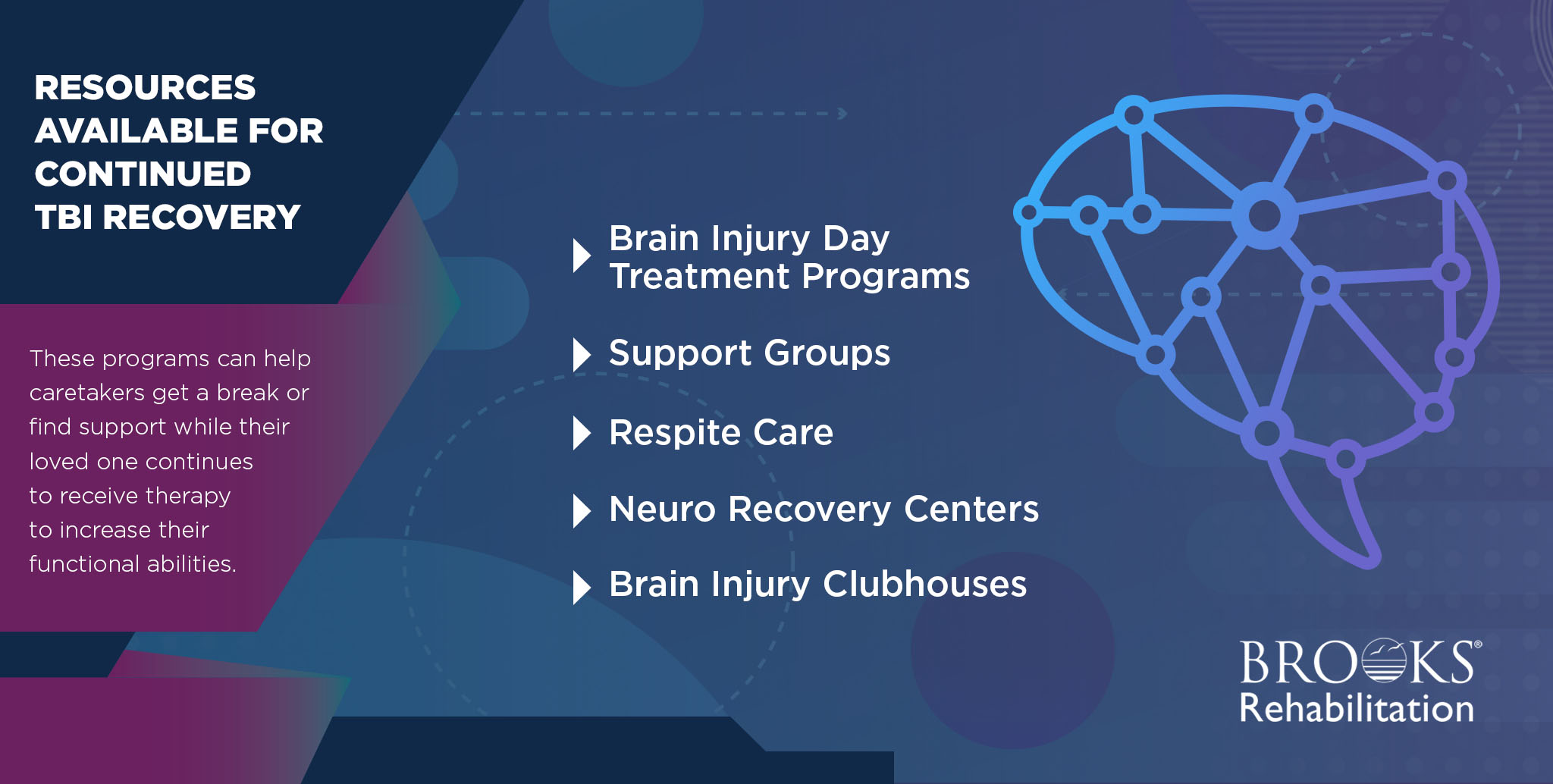Brain Injury Recovery Stages: How Family Can Help

Back to physical health resource hub
When a person experiences a brain injury, family and loved ones often experience changing roles.
It’s normal to feel overwhelmed by the changes and responsibilities. Family and friends play a crucial role in a loved one’s brain injury recovery. It’s also important for families to know they are not alone. Resources are available, and it’s important for families to care for their mental health as well.
This article will discuss some of the ways family can support a loved one’s recovery, how primary caretakers should take care of themselves during this time, as well as resources for families and patients for continued recovery.
Family’s Role in TBI Recovery of a Loved One
Family members play an important role in recovery no matter the severity. Even individuals with mild TBIs may have physical side effects that must be watched, as they often have behavioral changes, such as increased anxiety or anger.
This can lead to financial stressors, communication issues, lack of outside support and less personal time, among other issues.
While a traumatic brain injury can be scary, Gail Anderson, PsyD, a clinical rehabilitation psychologist at Brooks Rehabilitation, stresses that it’s important not to panic. “Nothing is as it seems early on. People say and do all kinds of things when their brain is first injured. The brain is not working properly. That doesn’t necessarily mean those changes are permanent.”
Dr. Anderson adds it is important for family to manage other people’s expectations – especially regarding the patient’s work, familial and community obligations. “If someone has a severe brain injury, they’re not going to be available for a while.”
Brain Injury Recovery Stages and How Family Can Help
Brain recovery involves two key areas: cognition and memory. To help determine the severity of a patient’s traumatic brain injury and to recognize the patient’s progress, many physicians use the Rancho Los Amigo Level of Cognitive Functioning. This guide evaluates a patient’s cognitive abilities and develops a treatment plan according to the level.
The guide’s eight levels are as follows:
Level 1: No Response
The patient has no response to sights, sounds, touch or movement.
Level 2: Generalized Response
The patient starts responding slowly or inconsistently to stimuli such as increased breathing, sweating, heart rate or blood pressure, moaning, chewing and other responses.
Level 3: Localized Response
The patient awakens on and off, increases movement, begins recognizing loved ones, follows simple directions, e.g., “squeeze my hand”; starts responding to yes and no questions, often inconsistently; and reacts more to what they see, hear and feel.
How you can help: During these first three stages, even though you may be getting little to no response, it’s important to talk with your loved one using your normal voice. If you do something for the patient, explain what you are doing, e.g., “I’m going to brush your hair.” Use short, simple sentences. Remind the patient who you are, where they are and why they are there. Keep the room calm and quiet. Limit visitors to allow your loved one to rest.
Level 4: Confused and Agitated
Patients are more alert, but often confused, anxious or agitated. At this stage, patients may overreact to what is going on, e.g., hitting, screaming, etc., and struggle to understand that people are trying to help them. They may have trouble concentrating, following directions and recognizing loved ones.
How you can help: During this stage, it’s important to reassure your loved one they are safe. Remind them who you are and why you are at the hospital. You can bring photos and other items from home. Introduce them to things they enjoyed before, like music and food. Don’t force them to do things they don’t want to do.
Level 5: Confused and Inappropriate
Patients can pay attention for short spans but are often confused. They may not know why they are in the hospital and how to conduct everyday actions. They may get tired or agitated by too many activities or people around. They also have problems remembering things, especially short-term, and may make things up to fill in the memory gaps. They may struggle to get beyond a certain step in an activity or move past a certain idea. They tend to focus on basic needs.
How you can help: During this stage, you will need to repeat things, often multiple times. You can try to introduce simple activities. Just be patient, repeat guidance and don’t try to force things.
Level 6: Confused and Appropriate
At this level, a person may still be confused but will better remember key points, often mixing up details. They may be able to follow a schedule but struggle with changes in routine. They can often focus for up to about 30 minutes if the surrounding atmosphere is not too busy or noisy or the activity does not involve too many steps. They can often remember how to do basic activities, such as brushing teeth, and can recognize the need to use the bathroom. They may know why they are in the hospital and are more aware of physical problems. They may think they will be all better once they get to go home.
How you can help: Try to help your loved one improve memory. Talk about things that took place during the day. Help your loved one start and stay focused on activities. Encourage your loved one to participate in all therapies.
Level 7: Automatic and Appropriate
At this level, the patient can follow a set schedule and independently conduct routine self-care. Because of this, they may think they will be able to return to their previous lifestyle and not recognize they still have problems with new situations, planning, follow-through, and paying attention, among other things.
Level 8: Purposeful and Appropriate
Patients at this level generally recognize they may have issues with thinking and memory and learn to compensate for these problems. Patients learn how to be more flexible in their thinking and how to learn new things at a slower rate. They may find new situations stressful or difficult, which can lead to poor judgment. They still need some help in decision-making and may have thinking problems that the average person may not recognize.
How you can help: By this point, it’s important to talk with your loved one as an adult, help them with making decisions but respect their opinions. Talk about their feelings. Help them with familiar tasks and help them identify problems with their thinking by gently reminding them it’s because of the brain injury. Encourage your loved one to continue therapy.

Taking Care of Yourself
In addition to helping your loved one in their recovery, Dr. Anderson stressed that it’s important to pay attention to not only the patient but yourself and your finances. Here are some of her recommendations:
- Once your loved one is medically stable, take a break from the hospital. Sleep at home.
- Don’t search for answers online. If you do, be specific, ask your questions, and then stop. Better yet, ask your care team for reliable sources to help you learn more about your loved one’s condition.
- Manage your finances by monitoring credit cards and activating short-term disability or other coverages.
- Make a “battle book.” This is a binder to keep all the important information: passwords, medication lists, treatment schedules, etc.
- Keep a planner with all treatments and schedules. Use it to jot down questions and thoughts as they come so you don’t forget them.
- Take care of your health. Once your loved one is progressing, don’t put off your regular doctor’s visits, eye exams, teeth cleanings, etc.
- Talk to a professional. The stress of caring for a loved one with a TBI can be significant. A professional counselor can help. Family support groups can also help you connect with others who are going through similar situations.
- Ask friends and family for help. You don’t have to do this alone.
What is Progress in TBI Recovery?
Brain injuries differ in symptoms and severity, and so does recovery. Several factors affect recovery, including the type of injury, the severity of the damage, the location of the injury, how long the patient was in a coma, as well as several other factors. The amount and types of therapy play a key role as well.
The three primary types of TBIs are considered mild, moderate or severe. According to the American Association of Neurological Surgeons, most patients with mild TBIs recover within a few months – sometimes in just a few days. Of those with moderate TBIs, approximately 60% will make a positive recovery, while 25-33% of those with severe head injuries have positive outcomes.
With therapy, moderate TBIs usually recover at least some, if not all, cognitive functioning, but it can take months or even years. Some severe TBI cases can have a full recovery, and most can at least improve cognitive functioning with help.
Sometimes, the longer the patient is unconscious following a TBI, the longer the road to recovery can be. Brain injuries are all different, so make sure to discuss expectations and concerns with your loved one’s care team.
For many, it’s a lifelong journey where the goal changes from returning to their previous lifestyle to creating a life where they can largely care for themselves.

Recovery may seem faster at first, then slow down, which can lead to feelings of frustration. To help with this, Dr. Anderson suggests taking photos and videos throughout the patient’s recovery process. “Try not to ruminate on them, but use them as reminders of how far your loved one has come.”
This can be especially helpful as progress may seem to plateau during later treatment stages. It’s important to remember where they were at first compared to where they are now.”
Resources Available to TBI Patients and Families
Brooks Rehabilitation offers a number of services for TBI patients and their families:
- The Brain Injury Day Treatment Program is for moderate to severe brain injuries and helps ease the transition from inpatient or acute care to home, creating an environment for growth, recovery and relationships.
- The Brain Injury Clubhouse provides a unique place for brain injury patients to participate in a variety of activities such as exercise, music, art, games and field trips, as well as regain work skills by working at the facility.
- Support groups provide patients and their families and friends opportunities to connect with others going through brain injury recovery.
- Respite care provides short-term residential care for family members and other caregivers who need time away.
- Neuro Recovery Centers provide state-of-the-art specialized equipment to help patients continue their exercise and conditioning outside of their scheduled therapies.

TBI Recovery Stories
Patients who experienced traumatic brain injuries and their recovery teams share how they recovered using the resources and programs available at Brooks Rehabilitation.
Alese Hairston suffered a TBI and was almost in hospice care after several setbacks. Discover how she turned her recovery around through Brooks Rehabilitation’s inpatient brain injury rehabilitation program. Read more about Alese Hairston.
Lauren Ray suffered a traumatic brain injury during a car accident. Learn more about how her care team developed an individualized care plan around her passions and hobbies to help her recover balance, improve decision-making and perform daily living activities. Read Lauren Ray’s story.
How Brooks Can Help
Brooks Rehabilitation’s expert staff is here to help your family find their way through additional resources and treatment programs. To learn more about our traumatic brain injury treatment programs and resources, visit our brain rehabilitation program page.


